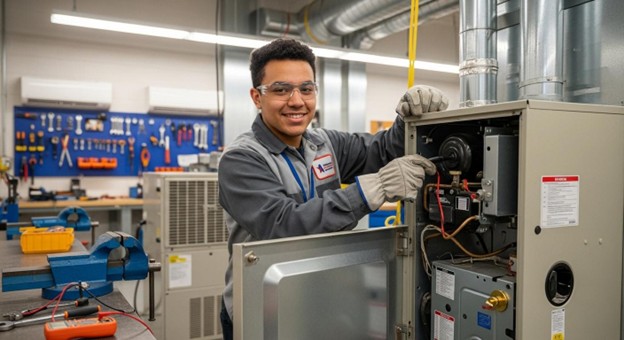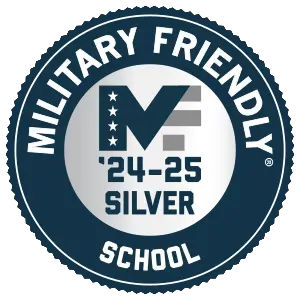A Career in HVAC—What Does Day-to-Day Look Like?

Are you interested in becoming an HVAC technician, but not sure what their day-to-day duties look like? The HVAC field is a mix of technical skills that keep homes and business cool in the summer and warm in the winter. But what does a typical day in the life of an HVAC technician actually look like?
Every Day Is Different
The first thing you will notice is that no two days are the same. One day you might be fixing a furnace. The next, you’re up on a commercial rooftop replacing an air unit. HVAC technicians handle a wide range of scenarios, including planned maintenance, installation, and emergency calls.
A Typical Workday
Most HVAC technicians start early. The day begins at the shop, where they check in, restock the truck, and look over the work orders for the day. An HVAC technician’s van is a mobile workshop because it carries tools, meters, spare parts, and safety gear for every situation.
After getting your route for the day, you will plan your stops. The first call might be a residential service visit. A homeowner’s air conditioner isn’t cooling, and the inside temperature is rising. When you arrive, you talk with the customer to get the details, then start inspecting the system. You check the thermostat, filters, and refrigerant levels. In this case, you might find a clogged condenser coil and low refrigerant charge. You clean the coil, fix the leak, recharge the refrigerant, and test the system to make sure everything’s running smoothly. Before leaving, you explain what went wrong and show the homeowner how to avoid the same issue in the future.
Next, you might go to a commercial site for an installation. You unload heavy parts like blowers, coils, and ductwork, then work with a team to mount the new system. You wire the control board, connect refrigerant lines, and make sure the thermostat communicates correctly. Once everything’s connected, you test for leaks, pull a vacuum, and charge the system with refrigerant. After a few checks, you start the unit and verify it’s running efficiently.
By late afternoon, you might complete a maintenance visit. Preventive maintenance is an important part of HVAC work. This includes tasks like cleaning burners, checking the heat exchanger, inspecting belts and motors, and ensuring the system is safe for continued use. These visits help customers avoid costly repairs later.
Before ending the day, you fill out your service reports. Then you head back to the shop to restock your truck for tomorrow. Some days end on schedule, but others don’t. If an emergency call comes in, you might stay late to help a family with no heat in the middle of winter.
Real Projects HVAC Technicians Handle
HVAC work includes a wide range of projects, from small fixes to full system replacements. For example, in a home system replacement, you would remove the old condenser and coil, install new copper lines, vacuum out moisture, and recharge the system with refrigerant. Then wire a new thermostat and verify that everything runs correctly.
On a larger commercial job, you might be part of a team installing a rooftop unit. These jobs often require a crane to lift the heavy system onto the roof. You would connect the duct transitions, wire controls, test airflow, and balance the system so every zone gets even heating or cooling.
HVAC technicians also spend time on maintenance and tune-ups. Cleaning filters and coils, checking refrigerant pressures, and adjusting thermostat settings are all common tasks. These service calls keep systems running efficiently and help prevent breakdowns.
Other days, you might troubleshoot a refrigerant leak. Using leak detectors and gauges, you will track down the issue, replace the damaged section of pipe, and recharge the system.
Another advanced project is testing and balancing airflow in a commercial building. Using specialized instruments, you will measure how air moves through the ducts and adjust dampers so that every space gets the right amount of conditioned air.
How OBC’s Curriculum Fits into the Job
At OBC, the HVAC Diploma Program mirrors what you will do in the field. The 54-credit-hour program includes hands-on lab work and technical courses that directly connect to the real-world situations we just talked about.
In the Residential Heating and Cooling course, you learn how to install and service systems found in homes. This information is practical when you are called to replace a system or diagnose airflow problems in an attic or basement.
The Commercial Heating and Cooling courses cover larger systems, like the rooftop units you will see in office buildings and schools. You learn how to manage the wiring, ductwork, and safety controls these systems need to run safely and efficiently.
In our Customer Service and Communication courses, you will practice explaining repairs in simple terms and offering solutions customers can understand. These soft skills make a big difference in customer trust and satisfaction.
The Troubleshooting and Diagnostics training helps you read wiring diagrams, trace electrical faults, and identify component issues.
OBC also helps you prepare for the EPA 608 Certification, which is required for anyone handling refrigerants. You will learn how to recover, recycle, and safely dispose of refrigerants according to federal law.
Finally, our Electrical Wiring and Controls and Airflow and Duct Design courses teach you the technical foundation for wiring thermostats, sizing ducts, and balancing airflow, which are all tasks you will do every day in the field.
Final Thoughts
A career in HVAC is busy, hands-on, and constantly changing. You will install, repair, test, and troubleshoot systems large and small. You will meet different people, work in new places, and face fresh challenges every day.
Thanks to our practical HVAC training, you will enter the field ready to hit the ground running. The projects, lessons, and certifications you complete during school prepare you for what you will do every day. If you take pride in seeing your work make a difference, HVAC could be the perfect career to build your future.
Want to Learn More?
Now that you understand how we prepare you for residential and commercial HVAC, take the next step. Learn more about Ohio Business College today. If you have a passion for heating and cooling, working in the HVAC/R industry might just be for you. Entering a career in a field as potentially rewarding as HVAC/R all starts with an HVAC/R training program. At Ohio Business College, we can help you gain the skills and knowledge that can serve as the foundation of a rewarding career as an HVAC/R technician.
Contact us today to learn more about our HVAC/R program.

